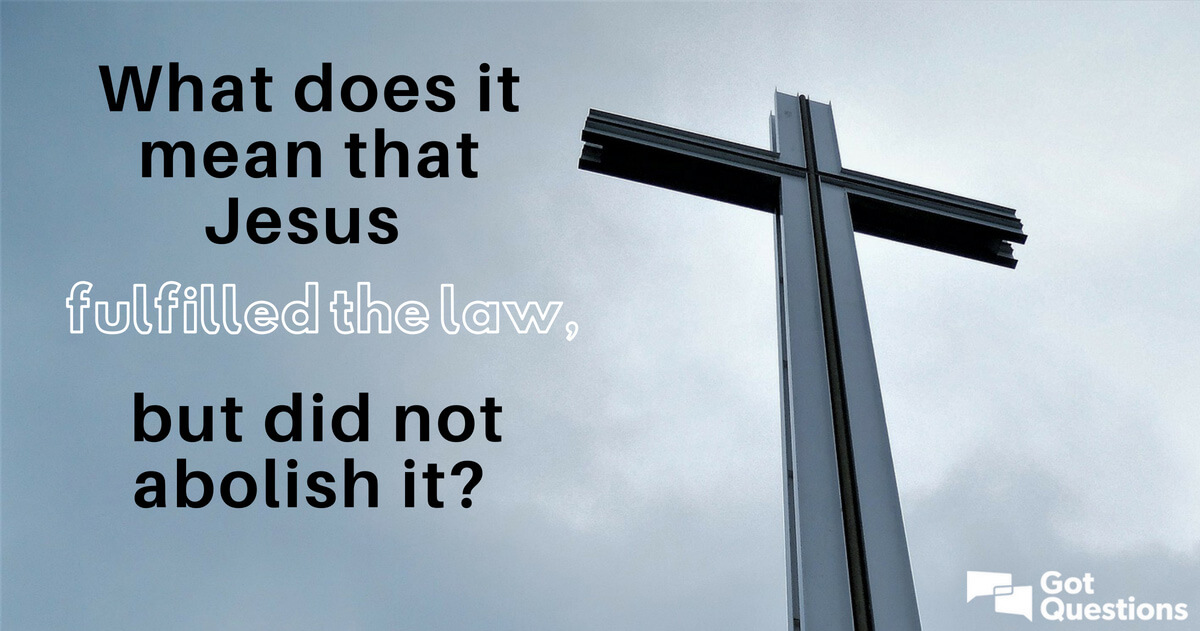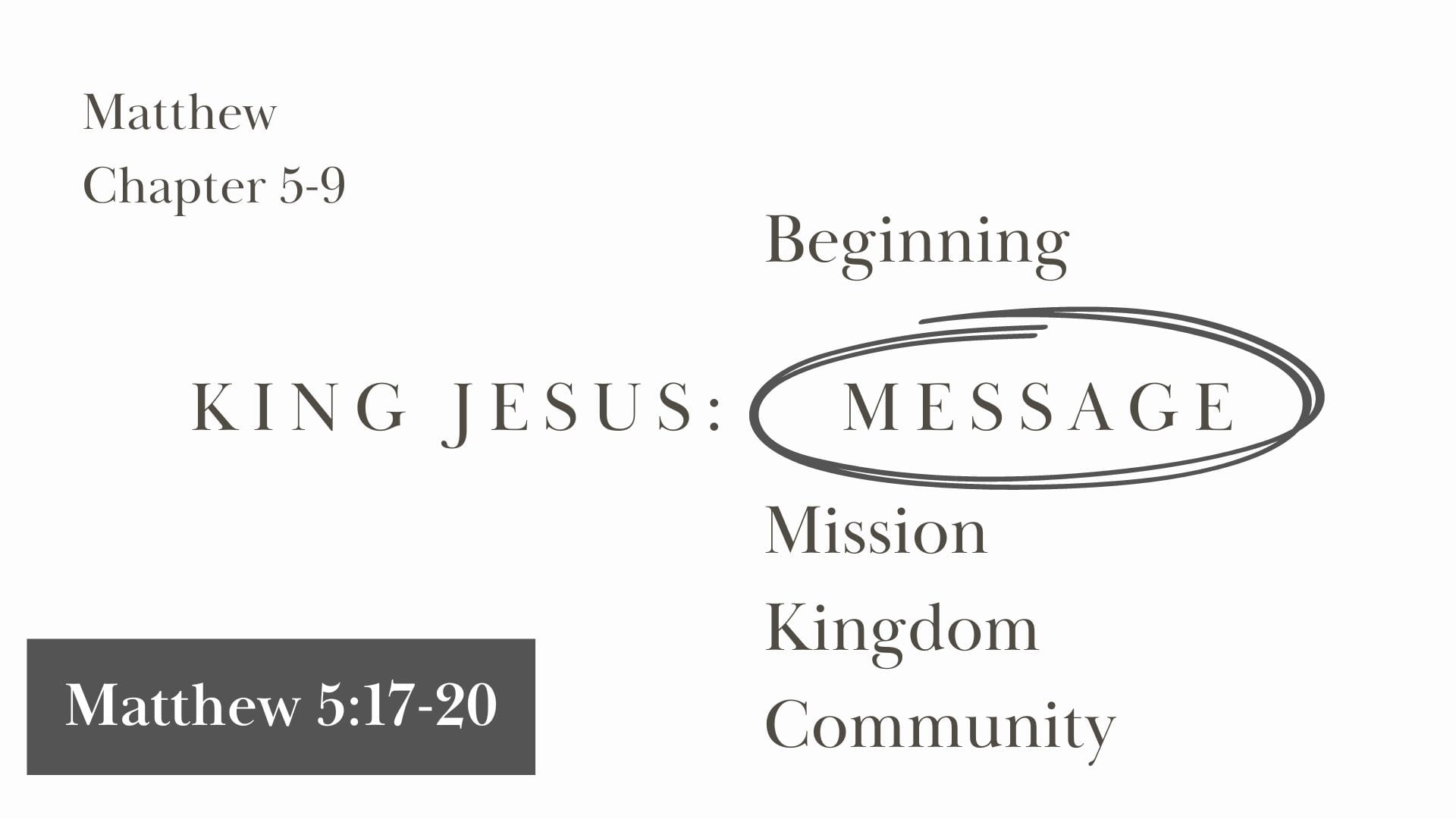Text:
17 “Don’t misunderstand why I have come. I did not come to abolish the law of Moses or the writings of the prophets. No, I came to accomplish their purpose. 18 I tell you the truth, until heaven and earth disappear, not even the smallest detail of God’s law will disappear until its purpose is achieved. 19 So if you ignore the least commandment and teach others to do the same, you will be called the least in the Kingdom of Heaven. But anyone who obeys God’s laws and teaches them will be called great in the Kingdom of Heaven.
20 “But I warn you—unless your righteousness is better than the righteousness of the teachers of religious law and the Pharisees, you will never enter the Kingdom of Heaven!
The Foundation of the Kingdom of God is an unshakable joy that grows from the bottom up.
Overall Commentary: 🌎
The words of Jesus have always been controversial. They challenge us because He doesn't mind telling us where we are wrong, and He makes no exWhenme when Jesus spoke these words, the Bible was only in the form of the Old Testament. The Jewish people called it the Tanak, which was under attack, much like the Bible is today. The scribes and Pharisees had collected many sayings but teachers over time into works such as the Talmud and the Mishnah. These ancient writings were supposed to help the readers understand the Old Testament better. The problem was the Pharisees were holding up the opinions of man as just as important as the Scripture. Jesus attacks this head-on.
Jesus takes the few verses above to set the record straight. He reminds the audience that the Bible, the Old Testament at the time, is the divinely inspired Word of God and is not going anywhere. He engages in what we now call Apologetics. Apologetics sounds like we are asking forgiveness for something. That's not it at all. Apologetics is from a greek word meaning to defend. Jesus is upholding the validity and inerrancy of the Scripture. This is so important today because the Christian world is quickly beginning to divide across many lines. Two of the lines that divide us are between what we call Historic-conservative Christianity and Progressive Christianity. Here are some definitions.
Historic-conservative Christianity- During the past one hundred or so years since the fundamentalist-modernist controversy, the word “conservative” has regularly been applied to Christians who believe that the Bible is valid in all that it affirms, including such historical realities as the virgin birth of Christ and the literal resurrection of Jesus from the dead. This label contrasts with “theological liberal,” which describes someone who challenges the truthfulness of the Bible, including many of its historical claims. Be sure to note: This has nothing to do with political terms relating to particular parties. *taken from the links website.
Progressive Christianity- Defining the progressive church belief system is like nailing jello to a wall. It changes depending on the conversation. This is because it is so new. However, Alisa Childers has done excellent work on the topic. I highly recommend her entire website. For a quick idea, she says these are five signs you might be sliding toward progressivism:
- You have a low view of the Bible. You do not see the Bible as the Divinely inspired Word of God without falsehood and error.
- You emphasize feelings over facts. You tend to view personal experiences and opinions over objective truth.
- The essential Christian doctrines are open for re-interpretation. i.e., the Ressurection of Jesus, LGBTQ stances, literal Heaven and Hell.
- You have no problem with redefining historical terms. i.e., sin, re-interpreting the Bible, love, hell.
- In your view, the heart of the Gospel message should shift from sin and redemption to social justice.
This is a message we need to hear today. Jesus is defending the validity of the inerrancy of Scripture. Inerrancy means the Bible is true, without falsehood or deceit, and completely trustworthy. It is without error because it is divinely inspired. Jesus makes an important distinction because without trusting the Full Bible, you call Jesus a lair. That makes you something besides a Christian.
The inerrancy of Scripture is one of the great debates of our time. We must get this right so we do not slip into error and, eventually, heresy. As Christians, we hold to the inerrancy of Scripture because Jesus did. That is enough for me.
In the following few verses, Jesus lays out the utter supremacy of Scripture. Afterward, in the coming weeks, He will build on this with practical examples of how to work out the principles in God's Word.
Verse 17- The Scripture reveals the Mission of Jesus.
Cross-references: Romans 10:4, Luke 16:17, Galatians 4:4-5, Romans 8:4, Romans 3:31, Isaiah 42:21, Galatians 3:17-24, Hebrews 10:3-12, Psalm 40:6-8, Colossians 2:16-17, Acts 6:13, John 8:5, Acts 18:13, Acts 21:28
"Law of Moses or the Writings of the Prophets"- During the time of Jesus, different groups promoted different parts of the Old Testament. The Sadduccees endorsed only sections of the Law of Moses (The Torah- first five books). The Pharisees promoted the whole thing, plus others. Jesus says He has inspired the entire Old Testament but nothing else. This would have been wildly controversial and caused people to look around and see who would throw the first stone.
"Don't misunderstand"- Jesus realized what He was saying was controversial and stood against the extra-Biblical teaching of the time.
"I came to accomplish their purpose"- Jesus is the perfect fulfillment of the Old Testament for three main reasons:
- He lived a perfect life and fulfilled the righteous requirements of the Low.
- He became the sinless sacrifice required by the Ceremonial Law.
- He fulfilled the prophecies of the coming King.
Verse 18- The Scripture is God-Inspired and Trustworthy.
Cross-references: Luke 16:17, Psalm 119:89-90, 1 Peter 1:25, Isaiah 40:8, Matthew 24:34-35, Mark 13:30, Isaiah 51:6, Psalm 102:26, Revelation 20:11, John 5:19, Psalm 119:152, Matthew 19:23, 2 Peter 3:10-13, Hebrews 1:11-12, John 21:18
"I tell you the truth"- In Greek, the word here is "amen." If you have attended church before, you have likely heard someone yell this out occasionally. Amen means "truth," "I agree," or "Let it be so." Amen is often used at the end of a sentence, prayer, or blessing. Jesus places it at the beginning of the sentence to add emphasis. He is saying, "Everyone, listen up. This is important."
"Not one jot or tittle"- The translators may have decided to say what this verse means depending on your translation rather than using the phrase "jot or tittle." It means that even the smallest letters of the Scripture will endure. This is because the "jot" and "tittle" were the minor markings of the ancient Hebrew language. They are a lot like the apostrophe (') in English. Jesus is speaking hyperbolically here, but He is still saying something unique. He is not leaving the Scripture open for re-interpretation or new ideas. He is saying He has inspired His Word—all of it.
"Not pass away until its purpose is achieved."- Jesus is saying the Scripture will continue to endure until the end of the age. It is not going anywhere. Some liberal scholars say Jesus is referring to His Resurrection. The Scripture also speaks of the ultimate fulfillment of Christ's reign at the end of days. This will have to happen for the law to be fully complete. However, it is essential to state the sacrificial part of the law has been fulfilled through the Resurrection of Jesus.
Here is a link to an article on why you can trust the Bible...
Verse 19- The Scripture teaches that greatness is grown through obeying its principles.
Cross-references: Deuteronomy 12:32, James 2:10-11, Matthew 28:20, Romans 13:8-10, Matthew 11:11, Revelation 2:20, Titus 3:8, 1 Timothy 6:3-4, Daniel 12:3, Psalm 119:128
"Least Commandment"- Jesus says all commands are essential. Not only the ones we think have value. All have value. The trick is understanding how to interpret the "spirit" of the law and not the letter of the law. This is because there are three different types of laws laid out in the Old Testament:
- Moral Law- This is mainly the Ten Commandments and the laws surrounding them. The New Testament believer used the principles of these laws to define sin and freedom.
- Ceremonial Law- These laws outline the sacrifices and festivals God requires for worship and penance. The New Testament believer used the principles of these laws to understand how to love God with everything.
- Civil Law- These laws lay out how to treat our neighbor. The New Testament believer used the principles of these laws to love our neighbor as ourselves.
I will be the first to say this is an extreme oversimplification of the law of God. However, the goal is to give you an idea of how to interpret the Bible as a New Testament believer.
Think of it this way: God inspired the New Testament writers to make lists of areas that would steal away our freedom and birth sin in our lives. Where do you think Peter, James, John, Jude, and more got these lists? The Old Testament applied to practical life. We use the Old Testament principles in everyday life to discover where sin is and find freedom. That is what God commands us to do today.
"Great in the Kingdom of Heaven"- I love that Jesus says those who are great in the Kingdom of Heaven are not the most successful on the outside. They are most successful at living their life according to God's ways.
Verse 20- We joyfully obey from a place of acceptance, not striving.
Cross-references: Romans 10:2-3, Philippians 3:9, Romans 9:30-32, Luke 16:14-15, Hebrews 12:14, John 3:3-5, 2 Corinthians 5:17
"Unless your righteousness is better... you will never enter"- This would have drawn a gasp from the audience because the Pharisees and scribes were strict. They would fast twice weekly and tithe the smallest spice from their kitchen. They were perfect when it came to the letter of the law. Jesus isn't talking about perfection based on rules. He is talking about holiness from the inside out.
I don't obey God's Word to earn God's love. I joyfully obey God's Word because I already have it.
I like how Voddie Bachaum says,
"I choose to believe the Bible because it is a reliable collection of historical documents written down by eyewitnesses during the lifetime of other eyewitnesses. They reported supernatural events that took place in fulfillment of specific prophecies and claimed that their writings are divine rather than human in origin."
Questions/Journal Prompts for reflection
- Have you wondered about the purpose of the Old Testament?
- What you believe about God's Word is essential. Explain why?
- How does seeing the Old Testament as principles to live by help you when reading it?
- Have you ever struggled with feeling accepted by God? Why?
Resources
View all the different apologetics articles I am currently working on.



.jpg?format=1500w)



















